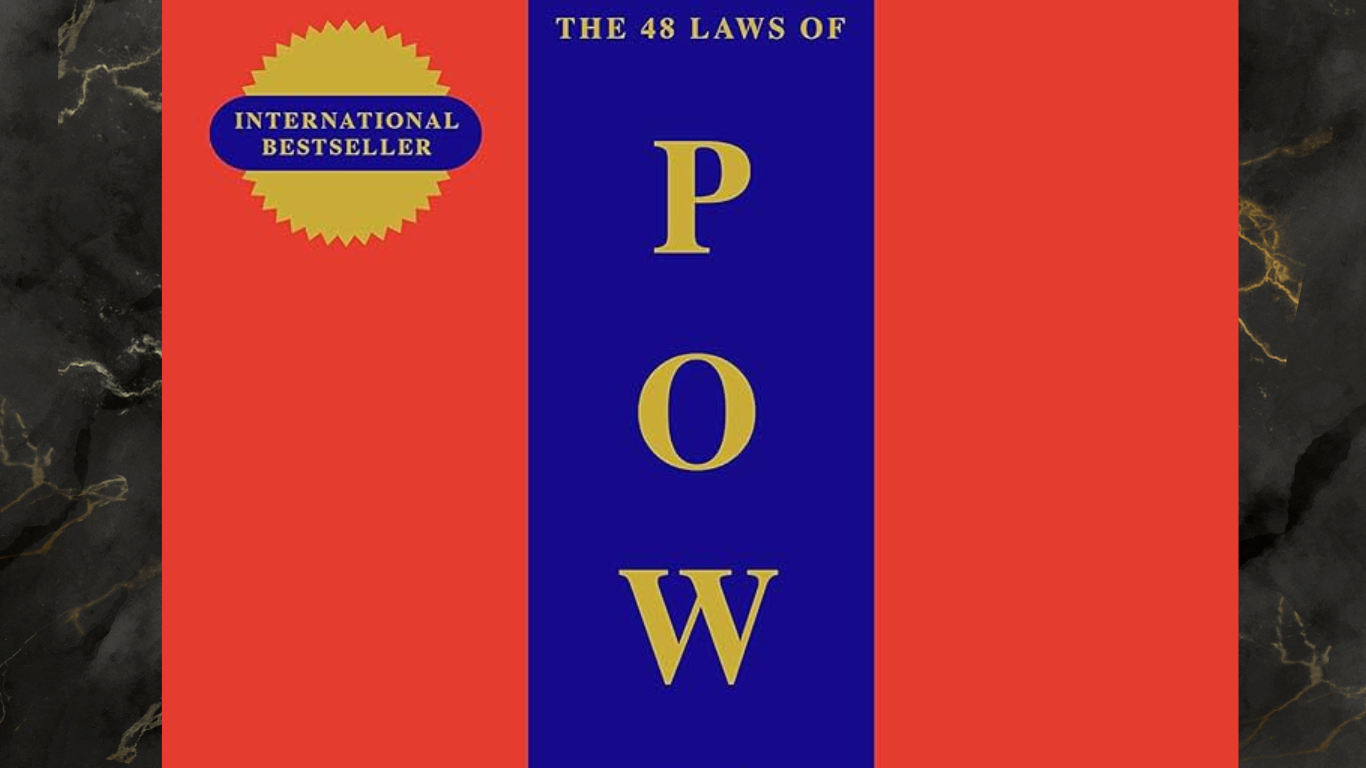Introduction
The “48 Laws of Power” by Robert Greene has captivated readers worldwide since its publication in 1998. This influential book delves into the dynamics of power, offering a mix of historical examples, philosophical reflections, and practical advice. It’s a favorite among leaders, entrepreneurs, and anyone interested in understanding the complex world of power and influence. In this comprehensive guide, we will explore each of the 48 laws, their implications, and how they can be applied in real life.
What is the “48 Laws of Power”?
The “48 Laws of Power” is a best-selling book by Robert Greene that outlines strategies to achieve and maintain power. Greene draws on historical figures such as Machiavelli, Sun Tzu, and Napoleon Bonaparte to illustrate his points, providing a rich tapestry of stories that make the laws not just theoretical but also actionable.
The book is divided into 48 laws, each dedicated to a particular principle of power. These laws range from the seemingly ruthless to the cunningly strategic, reflecting the complex nature of power itself.
Why Is It So Popular?
The popularity of “48 Laws of Power” stems from its raw, unfiltered approach to power. Unlike many self-help books that focus on positivity and morality, Greene’s work dives into the often uncomfortable reality of power struggles. The book doesn’t shy away from the darker aspects of human nature, making it a favorite for those who want to understand power in its entirety.
Who Is It Perfect For?
a. Aspiring Leaders and Entrepreneurs:
The “48 Laws of Power” is an invaluable resource for those who aspire to lead and influence others. It provides practical insights into the dynamics of power, making it ideal for entrepreneurs, managers, and anyone in a leadership position. The strategies outlined in the book can help readers navigate complex interpersonal relationships, negotiate effectively, and assert their authority in professional settings.
b. Students of History and Strategy:
The book draws heavily on historical examples, making it a fascinating read for history enthusiasts and those interested in military and political strategy. Greene’s use of historical anecdotes adds depth and context to the laws, making them more engaging and easier to understand.
c. Individuals Seeking Self-Improvement:
For those looking to develop a sharper understanding of human behavior and influence, the book offers valuable lessons on how to read people, anticipate their actions, and use that knowledge to your advantage. It’s a powerful tool for personal growth and self-mastery.
Who Is It Not Perfect For?
a. Individuals with Strong Ethical Reservations:
The “48 Laws of Power” can be controversial due to its pragmatic and often ruthless approach to power. Some of the laws may be seen as manipulative or morally questionable, which could be off-putting for readers with strong ethical values. If you prefer a more altruistic or collaborative approach to leadership, this book may not resonate with you.
b. Those Looking for a Light Read:
The book is dense, with each law thoroughly explained and backed by historical examples. It requires a thoughtful and engaged reader who is willing to delve into complex and sometimes dark aspects of power. If you’re looking for a light or quick read, this may not be the best choice.
c. People Who Prefer Collaborative and Egalitarian Approaches:
The “48 Laws of Power” often emphasizes power dynamics that involve hierarchy, control, and strategic manipulation. If you prefer leadership and success approaches that focus on collaboration, equality, and mutual benefit, the strategies in this book might not align with your values or preferred methods.
Law 1: Never Outshine the Master
The first law emphasizes the importance of keeping your superiors happy and maintaining their sense of importance. Greene advises against displaying your talents too openly, as this could threaten those in positions of power above you. Instead, be subtle and allow them to take credit, making them feel secure in their position.
Application: In a workplace setting, this might mean giving credit to your boss in meetings, even if the idea was yours. By making them feel valued, you gain their trust and protection.
Law 2: Never Put Too Much Trust in Friends, Learn How to Use Enemies
Friends are more likely to betray you, Greene warns, because they may feel entitled or envious. Enemies, on the other hand, have something to prove and can often be turned into allies.
Application: This law suggests being cautious about whom you trust and recognizing that enemies might offer opportunities for alliances. For instance, in business, a former competitor could become a valuable partner.
Law 3: Conceal Your Intentions
Keeping your plans and strategies secret is crucial to maintaining control over any situation. If people know what you are up to, they can thwart your efforts.
Application: In negotiations, this might involve not revealing your bottom line or true intentions until the right moment, giving you leverage over the other party.
Law 4: Always Say Less Than Necessary
The power of silence is profound. By saying less, you appear more powerful and enigmatic, leaving others to fill in the gaps with their interpretations.
Application: In leadership, this can be a powerful tool. By speaking less, you encourage others to talk more, revealing their thoughts and giving you insights into their motives.
Law 5: So Much Depends on Reputation – Guard It with Your Life
Reputation is everything in the pursuit of power. A strong reputation increases your influence and protects you from potential attacks.
Application: In personal branding, this law suggests carefully curating your image both online and offline. Consistency in your actions and words builds a strong reputation that can withstand scrutiny.
Law 6: Court Attention at All Costs
Visibility is key to power. By attracting attention, you assert your presence and influence over others.
Application: For entrepreneurs, this could mean leveraging social media to maintain a strong public profile. Regular posts, engagements, and thought leadership pieces keep you in the spotlight.
Law 7: Get Others to Do the Work for You, but Always Take the Credit
Delegating tasks while ensuring you receive credit for the results is a common strategy in the pursuit of power.
Application: In a corporate setting, effective delegation means assigning tasks to capable team members while you focus on high-level strategy. When the project succeeds, ensure your leadership role is recognized.
Law 8: Make Other People Come to You – Use Bait if Necessary
By making others approach you, you control the terms of engagement and maintain the upper hand.
Application: In negotiations, this could involve setting the stage for the other party to initiate the discussion, allowing you to dictate the pace and terms.
Law 9: Win Through Your Actions, Never Through Argument
Actions speak louder than words. Rather than getting entangled in arguments, demonstrate your point through decisive action.
Application: In conflict resolution, this might mean solving a problem directly rather than debating the issue, thereby asserting your authority through results.
Law 10: Infection: Avoid the Unhappy and Unlucky
Negativity and misfortune are contagious. Surround yourself with positive, successful people to maintain your own status and mental well-being.
Application: This law could be applied by networking with successful individuals and avoiding those who consistently bring negativity into your life.
Law 11: Learn to Keep People Dependent on You
Ensuring that others need you is a key component of power. If people are dependent on you, they are less likely to act against you.
Application: In the workplace, this might involve becoming the go-to expert in a particular area, ensuring your job security and influence.
Law 12: Use Selective Honesty and Generosity to Disarm Your Victim
A well-timed act of honesty or generosity can disarm even the most suspicious opponent.
Application: In sales, this might mean offering a small, genuine concession to build trust before closing a larger deal.
Law 13: When Asking for Help, Appeal to People’s Self-Interest, Never to Their Mercy or Gratitude
People are more likely to help you if they see something in it for themselves.
Application: When seeking assistance, frame your request in a way that highlights how the other party will benefit, making them more inclined to say yes.
Law 14: Pose as a Friend, Work as a Spy
Gathering information on others can give you a significant advantage. By posing as a friend, you can learn their secrets and use them to your benefit.
Application: In competitive industries, this might involve networking with rivals to gather insights into their strategies while keeping your own plans secret.
Law 15: Crush Your Enemy Totally
Leaving an enemy partially defeated only allows them to recover and seek revenge. Greene advocates for complete and total dominance to eliminate any future threat.
Application: In business, this might mean acquiring a competitor entirely rather than just outcompeting them, ensuring they no longer pose a threat.
Law 16: Use Absence to Increase Respect and Honor
Absence makes the heart grow fonder, and strategically withdrawing from situations can make others appreciate you more.
Application: This law could be applied in social media by taking a brief hiatus, making your return more anticipated and impactful.
Law 17: Keep Others in Suspended Terror: Cultivate an Air of Unpredictability
Predictability leads to complacency. By being unpredictable, you keep others on their toes and maintain control.
Application: In leadership, this might involve making unexpected decisions that keep your team engaged and responsive.
Law 18: Do Not Build Fortresses to Protect Yourself – Isolation is Dangerous
Isolating yourself from the outside world makes you vulnerable. Instead, engage with others to stay informed and maintain your power.
Application: In business, this could involve regularly attending industry events and networking to stay connected and avoid becoming obsolete.
Law 19: Know Who You’re Dealing with – Do Not Offend the Wrong Person
Not everyone reacts the same way to offense. Some people may seek revenge, so it’s essential to know your opponent’s temperament before acting against them.
Application: In negotiations, this law suggests understanding the personality of the other party to avoid making a fatal misstep.
Law 20: Do Not Commit to Anyone
By remaining noncommittal, you maintain your independence and freedom, allowing you to maneuver as needed.
Application: In partnerships, this might mean avoiding binding agreements until you are sure they align with your long-term goals.
Law 21: Play a Sucker to Catch a Sucker – Seem Dumber Than Your Mark
Underestimating your intelligence can lead others to lower their guard, giving you the upper hand.
Application: In strategic planning, this could involve downplaying your knowledge to lure competitors into a false sense of security before striking.
Law 22: Use the Surrender Tactic: Transform Weakness into Power
Sometimes surrendering can be a strategic move, allowing you to regroup and come back stronger.
Application: In conflict, this might involve conceding a point to avoid a larger loss, giving you the opportunity to fight another day.
Law 23: Concentrate Your Forces
Focusing your resources on a single goal increases your chances of success.
Application: In business, this could involve focusing on a niche market rather than spreading yourself too thin across multiple areas.
Law 24: Play the Perfect Courtier
The courtier’s skill lies in subtlety, diplomacy, and charm. Mastering these traits allows you to navigate complex social situations and gain favor.
Application: In corporate environments, this might mean honing your soft skills to influence decision-makers without direct confrontation.
Law 25: Re-Create Yourself
Self-reinvention is a powerful tool. By constantly evolving, you keep others from boxing you into a particular role.
Application: In personal branding, this could involve regularly updating your skills and image to stay relevant in a rapidly changing world.
Law 26: Keep Your Hands Clean
Avoid being directly associated with any unsavory actions. Instead, let others do the dirty work while you maintain a spotless reputation.
Application: In leadership, this might involve delegating controversial decisions to others while positioning yourself as the ethical leader.
Law 27: Play on People’s Need to Believe to Create a Cult-like Following
People have a deep need to believe in something. By tapping into this need, you can build a loyal following.
Application: In marketing, this could involve creating a strong brand narrative that resonates with your audience’s values and beliefs.
Law 28: Enter Action with Boldness
Boldness attracts attention and inspires confidence. Timidity, on the other hand, leads to hesitation and failure.
Application: In decision-making, this law suggests taking decisive action rather than second-guessing yourself, leading to stronger outcomes.
Law 29: Plan All the Way to the End
Successful strategists think several steps ahead, anticipating potential obstacles and planning accordingly.
Application: In project management, this could involve detailed planning that accounts for all possible scenarios, ensuring smooth execution.
Law 30: Make Your Accomplishments Seem Effortless
Appearing to achieve great things without effort makes you seem more powerful and capable.
Application: In presentations, this might mean practicing until your delivery is smooth and confident, making it seem natural and effortless.
Law 31: Control the Options: Get Others to Play with the Cards You Deal
By presenting others with limited choices, you maintain control over the situation.
Application: In negotiations, this could involve framing offers in a way that steers the other party towards your preferred outcome.
Law 32: Play to People’s Fantasies
People are often more motivated by their fantasies than by reality. By tapping into these fantasies, you can gain influence over them.
Application: In marketing, this might involve creating aspirational content that speaks to your audience’s dreams and desires.
Law 33: Discover Each Man’s Thumbscrew
Everyone has a weakness. By discovering and exploiting this weakness, you can gain the upper hand.
Application: In negotiations, this might involve identifying the other party’s pain points and using them to your advantage.
Law 34: Be Royal in Your Own Fashion: Act Like a King to Be Treated Like One
Self-confidence and self-respect command respect from others. By acting as though you are destined for greatness, others are more likely to treat you accordingly.
Application: In leadership, this might involve maintaining a strong presence and demeanor that inspires confidence in your team.
Law 35: Master the Art of Timing
Timing is everything. By waiting for the right moment to act, you maximize your chances of success.
Application: In business, this could involve waiting for market conditions to be favorable before launching a new product.
Law 36: Disdain Things You Cannot Have: Ignoring Them is the Best Revenge
Dwelling on what you cannot have only weakens you. By ignoring it, you deny it power over you.
Application: In competition, this might involve focusing on your strengths rather than envying your competitors’ successes.
Law 37: Create Compelling Spectacles
Dramatic, eye-catching events capture attention and create an aura of power.
Application: In marketing, this could involve launching a bold campaign that stands out and grabs attention.
Law 38: Think as You Like but Behave Like Others
Conformity can be a powerful tool. By blending in, you avoid attracting unwanted attention, allowing you to maneuver more freely.
Application: In corporate environments, this might involve adhering to company culture outwardly while pursuing your own goals behind the scenes.
Law 39: Stir Up Waters to Catch Fish
Chaos and confusion can be exploited to gain the upper hand. By stirring up trouble, you can force others to act impulsively, giving you an advantage.
Application: In negotiations, this could involve introducing a disruptive element to unsettle the other party, leading them to make mistakes.
Law 40: Despise the Free Lunch
What is offered for free often has a hidden cost. By refusing free offers, you maintain your independence and avoid entanglements.
Application: In business, this might involve being wary of deals that seem too good to be true, recognizing that they often come with strings attached.
Law 41: Avoid Stepping into a Great Man’s Shoes
Trying to replace a great leader often leads to failure. Instead, carve out your own path and avoid being compared to your predecessor.
Application: In leadership, this could involve establishing your own identity and vision rather than trying to emulate a previous leader.
Law 42: Strike the Shepherd and the Sheep Will Scatter
By removing the leader, you can dismantle an entire group. Targeting the source of power is often the most effective strategy.
Application: In corporate restructuring, this might involve replacing key executives to bring about significant change.
Law 43: Work on the Hearts and Minds of Others
Winning people’s hearts and minds is more effective than ruling through fear. By cultivating loyalty and trust, you ensure long-term power.
Application: In leadership, this might involve focusing on team morale and building strong relationships with your colleagues.
Law 44: Disarm and Infuriate with the Mirror Effect
Mirroring someone’s actions and behavior can disarm them and throw them off balance. By holding up a mirror, you force them to confront their own behavior.
Application: In conflict resolution, this might involve reflecting the other party’s behavior back at them, making them aware of their actions.
Law 45: Preach the Need for Change, but Never Reform Too Much at Once
People resist change, especially if it’s too sudden. By implementing gradual changes, you make them more palatable.
Application: In organizational change, this could involve introducing new policies gradually rather than all at once to avoid resistance.
Law 46: Never Appear Too Perfect
Appearing too perfect can inspire envy and resentment. By displaying a few flaws, you make yourself more relatable and less of a target.
Application: In personal branding, this might involve sharing some of your challenges and failures to connect with your audience on a more human level.
Law 47: Do Not Go Past the Mark You Aimed For; In Victory, Learn When to Stop
Knowing when to stop is crucial. Going too far can lead to your downfall, even after achieving success.
Application: In business, this might involve knowing when to exit a market or sell a business rather than overextending yourself.
Law 48: Assume Formlessness
Adaptability is the ultimate form of power. By remaining flexible and formless, you can adjust to any situation and overcome challenges.
Application: In leadership, this could involve being open to new ideas and approaches, allowing you to respond effectively to changing circumstances.
Conclusion
The “48 Laws of Power” offers timeless wisdom on the dynamics of power and influence. While some laws may seem controversial or ruthless, they reflect the complex and often harsh reality of power. By understanding and applying these laws, you can navigate the intricacies of power with greater awareness and effectiveness. Whether you’re a leader, entrepreneur, or simply someone interested in the mechanics of power, this guide provides a comprehensive overview of Greene’s influential work. Remember, the key to mastering power lies not just in knowing the laws, but in applying them with wisdom and discernment.
Key Takeaways:
- Power is a complex and multifaceted concept that requires a deep understanding of human nature.
- The “48 Laws of Power” provides practical advice for navigating the often treacherous waters of power dynamics.
- While some laws may seem harsh, they reflect the realities of power struggles in various contexts.
Recommended Books:
- “The Art of Seduction” by Robert Greene
- “Mastery” by Robert Greene
- “The Prince” by Niccolò Machiavelli
- “The Art of War” by Sun Tzu
FAQs for “The 48 Laws of Power”
1. What are the “48 Laws of Power”?
The “48 Laws of Power” is a book by Robert Greene that outlines 48 strategies to gain and maintain power in various aspects of life, including leadership, business, and personal relationships.
2. Who is the author of the “48 Laws of Power”?
The book is authored by Robert Greene, who is known for his works on strategy, power, and human nature.
3. Is the “48 Laws of Power” suitable for everyone?
While the book provides valuable insights, its content can be controversial. It’s essential to approach it with critical thinking, especially as some laws may appear manipulative.
4. What is the purpose of the “48 Laws of Power”?
The book aims to educate readers on the dynamics of power and how it can be effectively used or avoided in various situations.
5. Can the “48 Laws of Power” be applied in the workplace?
Yes, many of the laws can be applied in professional settings, particularly in leadership, negotiation, and conflict resolution.
6. Are the “48 Laws of Power” based on historical examples?
Yes, Robert Greene uses historical examples, anecdotes, and stories to illustrate each law, making them more relatable and actionable.
7. Is the “48 Laws of Power” considered ethical?
The ethics of the book are subjective. Some readers may find the strategies manipulative, while others see them as practical tools for navigating power dynamics.
8. How can I learn more about the “48 Laws of Power”?
You can read the book, explore summaries, watch videos, or join discussions online to gain a deeper understanding of each law.
9. Are there other books similar to the “48 Laws of Power”?
Yes, books like “The Art of War” by Sun Tzu and “The Prince” by Niccolò Machiavelli also explore themes of power and strategy.
10. Where can I buy the “48 Laws of Power”?
The book is available at major bookstores, online retailers like Amazon, and digital platforms such as Kindle and Audible.




